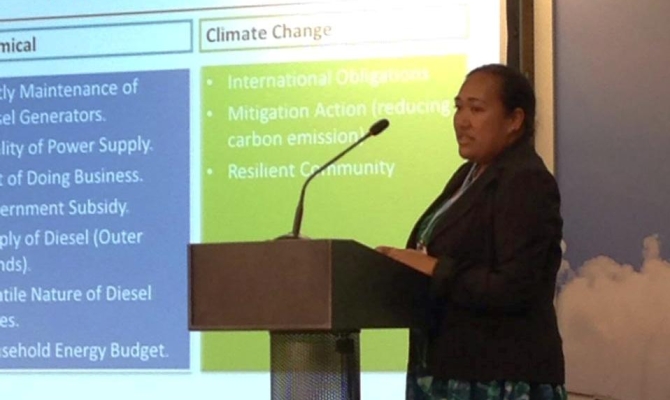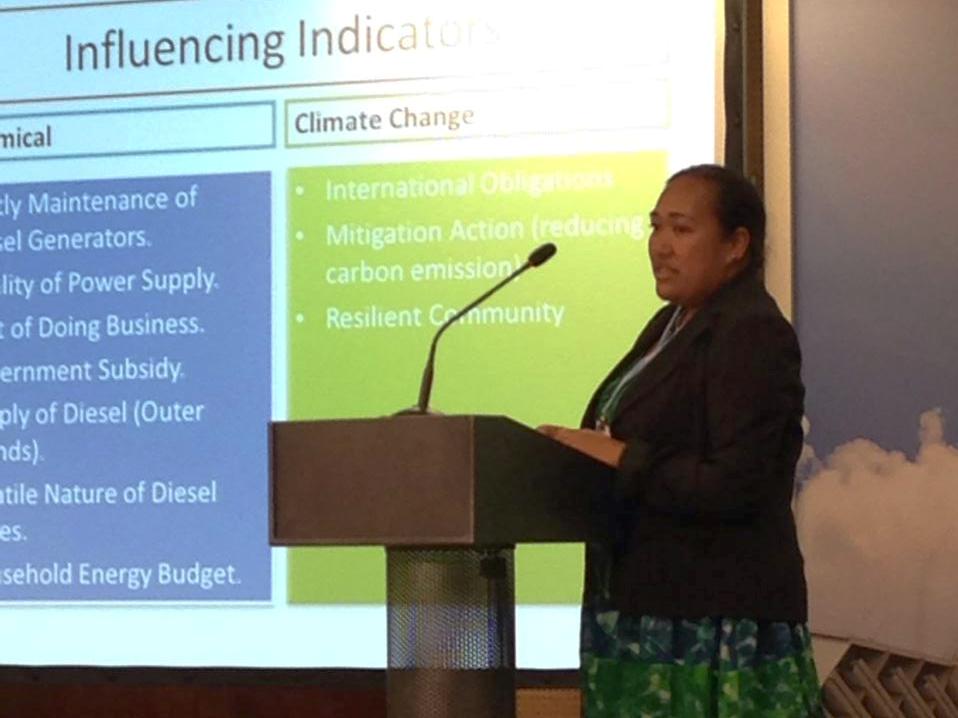
Climate Change Resilience
12 November 2013, UNFCCC COP 19, Warsaw Poland - In just over a year, 50% of the Cook Islands will be powered by renewable energy and then five years later in 2020 this will increase to 100%.
These targets set by the Government of the Cook Islands were announced at a special event in Warsaw, Poland this week, to show the diverse ways parties to the United Nations Framework Convention on Climate Change (UNFCCC) are reducing their greenhouse gas emissions.
While it is estimated to cost the nation over NZD 220 million dollars to achieve its 100% renewable energy target, the benefits in the long run are worth the investment.
 Ms. Mii Matamaki presenting at the 'Workshop under the SBI work programme to further the understanding of the diversity of NAMAs' - image courtesy of Ms. Amelia Fukofuka
Ms. Mii Matamaki presenting at the 'Workshop under the SBI work programme to further the understanding of the diversity of NAMAs' - image courtesy of Ms. Amelia Fukofuka
"The Cook Islands are the first Pacific island nation to register our NAMA, the Nationally Appropriate Mitigation Action, with the UNFCCC," said Ms. Mii Matamaki of the Cook Islands delegation after delivering a presentation on the Cook Island NAMA.
"It outlines how we intend to achieve our targets and reduce our greenhouse gas emissions to help mitigate climate change, these are plans that we have already started to implement. This was presented at the event which had a good outcome for us - we received interest from a possible donor to support us to continue implementing this plan of action."
A NAMA is a voluntary plan of action that outlines how parties intend to uphold their commitment to reduce greenhouse gas emissions that will mitigate climate change through different actions.
These are then registered with the UNFCCC to help seek support to carry out these actions and it's also the shows a country's commitment to slow global warming as a party to the UN Climate Convention.
The Cook Islands registered their NAMA in January this year.
The Nationally Appropriate Mitigation Action was developed through a project by the Secretariat of the Pacific Regional Environment Programme (SPREP) to form a NAMA guideline for the Pacific and then testing it out in a Pacific Island Country.
The result was a user-friendly guide and step-by-step process that Cook Islands successfully applied in practice.
"Our goal for 100% renewable energy is to help ensure an economically feasible way of living for residents on our islands. It's getting so expensive to run our electricity both at government level and for our households but it's an added bonus in that through using renewable energy we are also being environmentally responsible as well," said Matamaki.
There are 14 power stations throughout the 12 inhabited islands that rely on imported fuel. The challenges of ensuring fuel reaches these islands to power their generators, at an affordable cost, is ongoing and not always overcome.
"Many of our people now have a lifestyle whereby electricity has become a part of their life however the cost of fuel is a major burden for families. We only anticipate good outcomes all round once we achieve our target with support from partners - families will have power at a cheaper cost and our island nation will have reached low carbon development."
The special event on NAMA's at the 19th Conference of the Parties to the United Nations Framework Convention to Climate Change was held on Monday, 11 November.
The UNFCCC COP 19 takes place in Warsaw, Poland from 11 to 22 November.
The NAMA guideline was developed by the Global Climate Change Consultancy and SPREP, with significant inputs from Cook Islands stakeholders. It was funded by the Taiwan/ROC Regional Development Assistance programme and the Pacific Island Greenhouse Gas Abatement through Renewable Energy Project.
These targets set by the Government of the Cook Islands were announced at a special event in Warsaw, Poland this week, to show the diverse ways parties to the United Nations Framework Convention on Climate Change (UNFCCC) are reducing their greenhouse gas emissions.
While it is estimated to cost the nation over NZD 220 million dollars to achieve its 100% renewable energy target, the benefits in the long run are worth the investment.
 Ms. Mii Matamaki presenting at the 'Workshop under the SBI work programme to further the understanding of the diversity of NAMAs' - image courtesy of Ms. Amelia Fukofuka
Ms. Mii Matamaki presenting at the 'Workshop under the SBI work programme to further the understanding of the diversity of NAMAs' - image courtesy of Ms. Amelia Fukofuka"The Cook Islands are the first Pacific island nation to register our NAMA, the Nationally Appropriate Mitigation Action, with the UNFCCC," said Ms. Mii Matamaki of the Cook Islands delegation after delivering a presentation on the Cook Island NAMA.
"It outlines how we intend to achieve our targets and reduce our greenhouse gas emissions to help mitigate climate change, these are plans that we have already started to implement. This was presented at the event which had a good outcome for us - we received interest from a possible donor to support us to continue implementing this plan of action."
A NAMA is a voluntary plan of action that outlines how parties intend to uphold their commitment to reduce greenhouse gas emissions that will mitigate climate change through different actions.
These are then registered with the UNFCCC to help seek support to carry out these actions and it's also the shows a country's commitment to slow global warming as a party to the UN Climate Convention.
The Cook Islands registered their NAMA in January this year.
The Nationally Appropriate Mitigation Action was developed through a project by the Secretariat of the Pacific Regional Environment Programme (SPREP) to form a NAMA guideline for the Pacific and then testing it out in a Pacific Island Country.
The result was a user-friendly guide and step-by-step process that Cook Islands successfully applied in practice.
"Our goal for 100% renewable energy is to help ensure an economically feasible way of living for residents on our islands. It's getting so expensive to run our electricity both at government level and for our households but it's an added bonus in that through using renewable energy we are also being environmentally responsible as well," said Matamaki.
There are 14 power stations throughout the 12 inhabited islands that rely on imported fuel. The challenges of ensuring fuel reaches these islands to power their generators, at an affordable cost, is ongoing and not always overcome.
"Many of our people now have a lifestyle whereby electricity has become a part of their life however the cost of fuel is a major burden for families. We only anticipate good outcomes all round once we achieve our target with support from partners - families will have power at a cheaper cost and our island nation will have reached low carbon development."
The special event on NAMA's at the 19th Conference of the Parties to the United Nations Framework Convention to Climate Change was held on Monday, 11 November.
The UNFCCC COP 19 takes place in Warsaw, Poland from 11 to 22 November.
The NAMA guideline was developed by the Global Climate Change Consultancy and SPREP, with significant inputs from Cook Islands stakeholders. It was funded by the Taiwan/ROC Regional Development Assistance programme and the Pacific Island Greenhouse Gas Abatement through Renewable Energy Project.